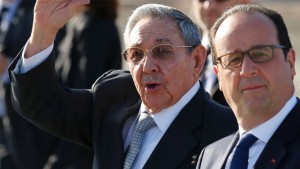
Cuba’s President Raul Castro waves to the press as he accompanies France’s President Francois who is departing Jose Marti airport in Havana, Cuba, Tuesday, May 12, 2015. Hollande’s one-day trip made him the first French president to visit Cuba since it became an independent country. (AP Photo/Desmond Boylan)
Cuba and the U.S. will name ambassadors to each other’s countries after the island is removed from the U.S. list of state sponsors of terrorism later this month, Cuban President Raul Castro said Tuesday.
Castro spoke to journalists at Havana’s international airport after seeing off visiting French President Francois Hollande.
The United States and Cuba have not had full diplomatic relations since 1961. Currently they have lower-level missions called Interests Sections in each other’s countries, under the protection of the Swiss government.
President Barack Obama in April announced his decision to remove Cuba from the terror list, which was seen a major obstacle for the opening of full embassies. A 45-day waiting period that would give Congress time to take action on Obama’s decision ends on May 29.
State Department spokesman Jeff Rathke said he couldn’t confirm Cuba’s timeline for an exchange of ambassadors. He said such a step would be “logical” once diplomatic relations are re-established.
Havana long has described the terror designation as unjustified and unfair.
“This sort of unjust accusation is about to be lifted and we’ll be able to name ambassadors,” Castro said.
Castro and Obama announced in December they would work toward a restoration of diplomatic relations after more than a half-century.
The Cuban president also said Tuesday he had expressed his concerns to Obama about American diplomats offering classes to independent journalists at the U.S. Interests Section in Havana, an activity he characterized as “illegal.”
Cuban authorities long have taken exception to contacts between U.S. officials and dissidents on the island.
